- Details
AFAM: Hello Michel and thank you for finding time to answer some questions. You have been living in the US since 1988. For more than 28 years you have been the CEO of Edge LLC. Please tell us a few words about yourself!
Michel: I moved here in 1988 indeed to start a company to distribute and create video games, as part of an international group of companies. In 1989 I also expanded the effort to Asia, in particular Japan.
That group eventually became a huge international video game group, with many studios and worldwide distribution. As such I had to manage internal cohesion (cultural understanding and differences, communication, processes and procedures, etc...) to make sure that we remained focused and efficient despite the diverse culture we were evolving in (cultural tastes, companies in many places in the world with very different cultural habits, employees from purely creative minds, to purely business like)
I also spent many years developing companies for operations and international development, focused a lot of my fundamental studies on strategy (how a company should be structured and principles under which it should operate to be coherent, efficient and thus successful) and on the cognitive science of decision making (and thus "expertise", experience, decisions models, etc..).
I also spent time on human interface development as a corollary to decision making science.
AFAM: This year you decided to join the AFAM team by becoming one of the Yosemite mentors. How come you joined this initiative? How do you see your role?
Michel: Well I started the initiative (Yosemite program) because having been in business development most of my adult life, I feel that there is much we can contribute to the gadz community. It is one of the weakness in our schooling, and one of the weakness in France (compared to USA). So, I feel that not only it needs to be demystified, as it certainly not as difficult as most people imagine, and we need to clarify the basic concepts for current gadz'arts to take the entrepreneurship route. Furthermore, it is a matter of survival, being an engineer is great, but to be the engine to drive innovations, new companies, new paradigms is even better, more interesting and very contributive to the economy at large (create new technologies, new jobs and so on).
So, Yosemite was created to not only educate as many people as possible in our community about entrepreneurship, but also to help anyone as much as we could since quite a few of us actually have direct experience with the subject matter (entrepreneurship and USA).
There is also a more personal objective that one first learns by listening, and experiencing, then one progresses by teaching said skills and experience. The third stage is to live it through the eyes and experience of others, when all the teaching has been done and refined, and find out what the "students" do with it, always hoping the student will then surpass the teacher. That is a fully enriching experience.
AFAM: Did you already act as a Yosemite mentor? Can you tell us more about it? What kind of mentees do you expect to join the program in the future?
Michel: I wish people would better understand what we can offer and not hesitate to use it.
Maybe I am over-optimistic as to how many people may have potential entrepreneurship envies or ideas, but I hope it's more, and will be more in the future. I really hope that a lot of people thinking it is super difficult, as it sometimes seems, would be open to understand that, in particular in the USA, it is much easier than it sounds, that a few basic principles are just what is needed, and then they launch themselves. The US ecosystem is particularly favorable to entrepreneurship, it should be understood and used.
And certainly, so by our gadz'arts community. We have all the tools to be extremely successful, from the capacity to think and learn, to broad technical education. All the hard learning is already done.
Don't misunderstand me, not everyone can be an entrepreneur, there are fundamentals traits that cannot be avoided to become successful, such as optimism, but a lot more people can be entrepreneurs, a lot more than think they can be, especially in our community.
AFAM: As an entrepreneur yourself, what piece of advice would you give today to gadz’arts willing to embrace an entrepreneurship career? Or maybe to those who dream of being entrepreneurs in the US?
Michel:
It is very difficult to generalize; each case is different. But if I had to give ONE advice, it would be:
A company is so simple at the end of the day, it's a "product" (product or service, or ...), for which one has to find customers (sales and marketing), and for which one has to make sure that it sells for more than it costs to create (R&D, sourcing, manufacturing, etc..).
It is just that simple, everything else is always back to said fundamentals. People should not make mountains out of it, and they should just start and keep going, "just do it".
The USA makes it a very easy ecosystem, as failure is tolerated, even encouraged, so there is no stigma in trying and failing (Chapter 11 or others). And trying and failing is the way to learn, become better and develop a new business model when needed.
It is also an ecosystem where entrepreneurship is well ingrained, understood and accepted by all the other actors (banks, investors, partners, etc..) so that makes it easier too.
Now for gadz'arts, as engineers, there is one particular culprit that is a natural tendency, that needs to be understood and "controlled" in order to succeed. It's not about the "perfect" product, it's not even about the "best" product. A good product (that answers a need) is good enough as long as what I wrote above stands (I can develop the market, and I can sell it for more than it costs me).
There are strategic cases where the "perfect" or the "greatest" product may be the focused engine, but that is not a common case, it's actually more of an exceptional one, and if such, then the whole company strategy needs to be in line with that very particular strategy, to become successful. It's a whole other vast subject.
The equation best product => (therefore) sales are/success is automatic, is just not true.
The real equation, as frustrating as that may be for us engineers, is typically the best sales and marketing strategy, with a "sufficiently satisfactory" product, is what works.
Never mind that "best" or "perfect" are either a subjective concept to start with (every product has good points and bad ones), or that it just doesn't exist (it is so tuned to a specific application, that either better can be created, or if the application is slightly evolving, then the product is too specific to remain "best" or "perfect").
We may not like that, or we may not agree with it in principle, but that is nevertheless how the world turns, so it should be understood and factored in the equation.
That is not to say that thriving for excellence (in products) is not a good endeavor, but it is to say that it's not THE only key to successful entrepreneurship. I would even go so far as to say that it's a whole different endeavor than entrepreneurship (more like scholar research, or fundamental research). Successful entrepreneurship is always about "sufficiently satisfactory excellence". The excellence is in the execution as a whole, not solely the product.
AFAM: thank you very much!
To know more Yosemite and to join the program, please contact us
To know more about our Yosemite mentors, please go to our website
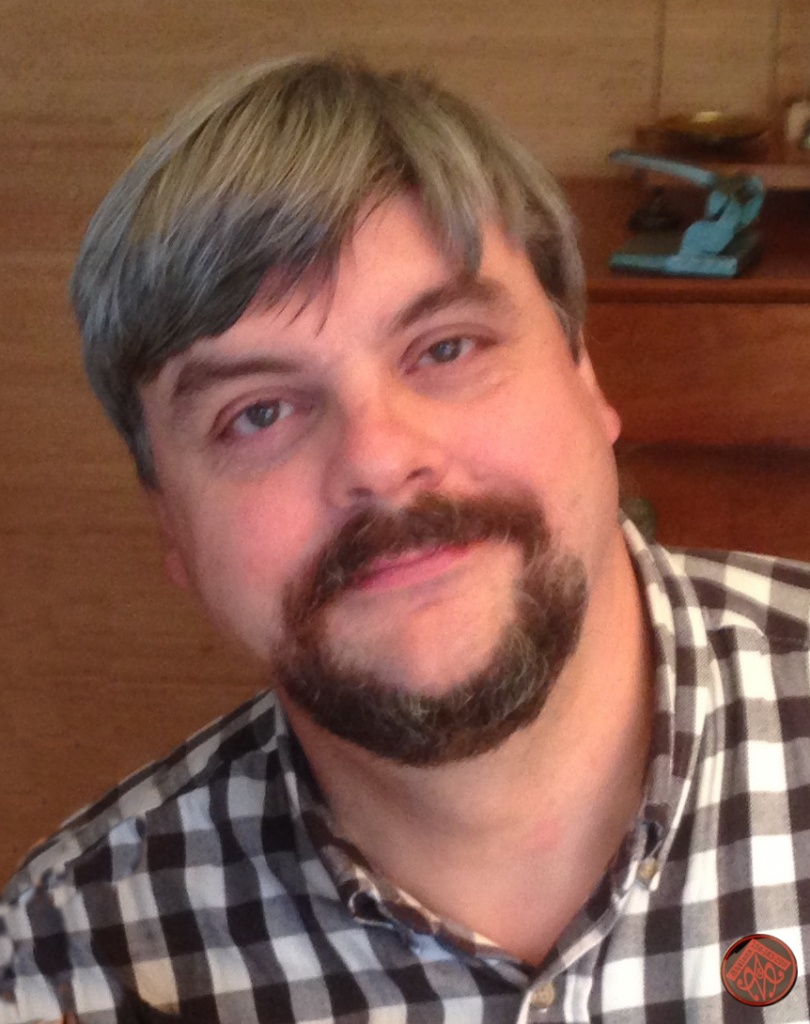
Photo courtesy of Michel
- Details
AFAM: Hello Bingbing, and thank you for sharing your experience of being a student at the American University. Please tell us a few words about yourself!
Bingbing:
I graduated from University of Michigan – Ann Arbor in December 2020 with a Msc in Mechanical Engineering. After my graduation, I worked as Mechanical Engineer in the theme park industry in Los Angeles for 3 years. I moved back to France in December 2020 and worked as an embedded software engineer in robotics in a French startup for 2 years. I am currently working as Research Engineer in AI for Robotics in a research institute in France.
TAKE MY WORD FOR IT:
The University of Michigan (Michigan or UMich) is a public research University in Ann Arbor, Michigan. Founded in 1817 it is Michigan's oldest public university. Since its establishment in Ann Arbor, the university has expanded to include some 500 buildings spread out over the city. The university consists of nineteen colleges and offers degree programs at undergraduate, graduate and postdoctoral levels in some 250 disciplines. The university's enrollment is approximately 32,000 undergraduate students and 16,000 graduate students.International students from some 130 countries account for 15 percent of the entire student body.
As a major research center, it ranked 2nd among American universities in research expenditures and produces a large proportion of the country's publications and citations.As of October 2019, 26 Nobel prize laureates have been affiliated with the University of Michigan.The university's noted alumni include eight domestic and foreign head of state of head of government, 42 cabinet-level officials; and 26 living billionaires.
(information taken from en.wikipedia.org)
Application requirements for Mechanical Engineering graduate degree:
https://me.engin.umich.edu/admissions/graduate/application-requirements
Getting ready
AFAM: What was the most challenging for you while getting ready for your application? What supporting document for your application required more effort and attention?
Bingbing:
The most challenging parts were the language tests and the application letters. TOEFL and GRE require a lot of preparation in advance and I strongly recommend future students to start preparing these tests since the beginning of the first year at Arts et Metiers. As the application letters require also a lot of work and preparation. if possible, get these tests done before starting the second year, so that you can focus on the application letters during the second year. The help of the English teacher at A&M Paris to review and rework the application letters, was really helpful when I make my graduate school applications.
AFAM: How many university applications are feasible to prepare and send without being completely overwhelmed?
Bingbing:
I applied for 4 universities. In my opinion, there are a lot of common points between different universities’ application requirements. It is completely fine applying 5-10 universities, and select the best option.
AFAM: Looking back, what do you think you would do differently regarding your applications?
Bingbing:
I would first prepare my English tests more in advance. Second, I would definitely put more importance in the choice of major and try to do internships related to what I want to do after the graduation. Doing an internship at university that you want to apply is very helpful for the application. Last but not least, I would try to overcome imposter syndrome. For example, I would try to write to the professors, who work in the domain that interest me, to find interesting collaboration opportunities.
TAKE MY WORD FOR IT:
Congrats! You are in!
Starting mid-March you will be receiving answers from Universities. Once you are admitted to an American University, you’ll need to think about your future trip, classes and financing.
Explore all possible options to finance your studies. There are plenty of them!
A full time semester at Michigan University corresponds to 8 credits or more. The price is the same. You can take less than 8 credits (“part time”) for your last semester. The price will depend on the number of credits taken (~prorata of full time). You’ll need 30 credits: 6 crédits in mathematics and 6 other credits. You need to respect all the requirements to validate your diploma. So, please plan all your classes in advance!
On average American students will finish a master’s degree with 3-4 semesters and it’ll take 2-3 semesters for French students.
For the Master of Science, there are mainly 3 means to finance studies:
- GSRA (Graduate Student Research Assistant)
GSRA is helping research professors. 10-20 hours/week is average time to spend. Every professor has his lab on campus. The good thing about GSRA is that tuition is reduced.
To find a GSRA you’ll need to look up research projects online and then contact ( go meet) professors you are interested in working with.
The problem is in a lot of cases the funds are reserved for PhD students. That’s why it might be difficult to find a GSRA.
- GSI
GSI position consists of assisting professors during an undergraduate class, to assure discussions (equivalent of “travaux dirigés”) and office hours when students are coming to ask questions.
There are different types of GSI - 25% ou 50%.
25% means 5 hours of work (answering students’ questions)
50% means offering classes for small groups ( about 3-5 hours/week). GSI can also do the exams topics and exams corrections too. What you’ll be doing is different depending on a class or a professor. Being a GSI, you will not pay tuition fees.
If you are both GSI and GSRA, you can be paid for the second position.
The dean of the faculty will choose a GSI. Criteria is to privilege PhD with no funding, then master’s degree students who choose the correspondent classes and finally those in master’s who did not choose these classes.
Another advantage of GSI is that the insurance will be paid by the school too (mandatory health insurance is $2,315/12 months)
- Grader
Correcting exams copies or home work ( about $12/hour or more, between 5-10 hours/week).
If you did not find GSRA or GSI position.
Questions to Bingbing:
AFAM: When did you receive the answer from Michigan University? Did you have any other admissions before/after? If there were other options, how did you decide that you’ll go to Ann Arbor?
Bingbing:
I received the admission email in May (I am not sure…). I received two admissions in total. I selected University of Michigan because it is very well ranked in Engineering departments.
AFAM: How did you finance your studies?
Bingbing:
I was very fortunate to receive the “Louis Magne Award” (le prix Louis Magne). In addition to that, I got a student loan from a French bank. I have worked in University labs and I have been grader during my master at University of Michigan. In addition to that, my summer internship at Disney has helped me to finance the last semester.
TAKE MY WORD FOR IT:
You are in the US! Yeeeee!
Mechanical engineering degree. Classes list:
- https://me.engin.umich.edu/academics/courses/
- https://docs.google.com/spreadsheets/d/1_8nFcGep1k_QlkY0LnKn4EJtAKSedIU07CL-AiDPaLI/edit#gid=0
Current students are here to help! The Mechanical Engineering Graduate Council (MEGC) has mailing lists you can contact for each functional area. They will respond to your inquiry promptly.
AFAM: What was your first impression of Michigan University when you arrived on campus?
Bingbing:
I was very impressed by the size of the campus. The transportation inside of the campus (MBus) is free and very convenient. In addition, I was very pleased to be received by the university and the other students. People are very open-minded and helpful.
AFAM: What was your favorite spot on Ann Arbor campus?
Bingbing:
I really enjoyed walking around the North Campus. As there is a lot of green space in the campus, you can frequently encounter deer and squirrels.
AFAM: What were your favorite classes?
Bingbing:
I really enjoyed classes related to robotics, such as introduction to autonomous robots. I learnt a lot about robotic programming and robotic applications. They made me decide to work in Robotics for my career after the graduation.
AFAM: What were the most challenging/difficult classes/ activities/practical elements for you?
Bingbing:
The most challenging part is classes choice. Opposite to France, students choose their classes themselves. In the beginning of each semester, students can try different classes to choose the ones they want to take. Ideally, you would like to take as many classes as possible. But, it is difficult to assess the amount of time required for each class in addition to the class time. You may fail some classes if you have too many classes.
I would recommend to take as much credits as possible during the two first semesters, so that during the third semester, you can take less than ten credits to reduce the tuition fees. Moreover, you will be able to spend more time in job application preparation.
AFAM: Do you think you missed some things at Ann Arbor you could have been able to enjoy?
Bingbing:
I think I was very lucky to meet excellent students from all over the world. I am very grateful of this experience. I don’t have things that I have missed in mind till now.
AFAM: Looking back to your Michigan University academic experience, what would you do differently and why?
Bingbing:
Looking back to this experience, I would definitely spend more time thinking and finding in what domain I want to work during that time. For example, I would probably apply for EECS major instead of ME and I would choose my classes to match my professional projects. Because I think the academic quality is very high at Michigan and a solid background in the domain you want to work is very helpful for the career development.
AFAM: After your graduation from Michigan University you found a job in the US but in 2020 you decided to come back to France. Why?
Bingbing:
I decided to come back to France because of personal reasons. What I want to highlight is the experience of studying and working in the US has been very helpful not only for my career development, but also my personal development. I highly recommend students to do a master and to have a professional experience in the US.
Thank you!
Bingbing Wu's and Florian Julé's Louis Magne report is available on request.
Please
Also read "Being grateful: from beneficiaries of Louis Magne grant"
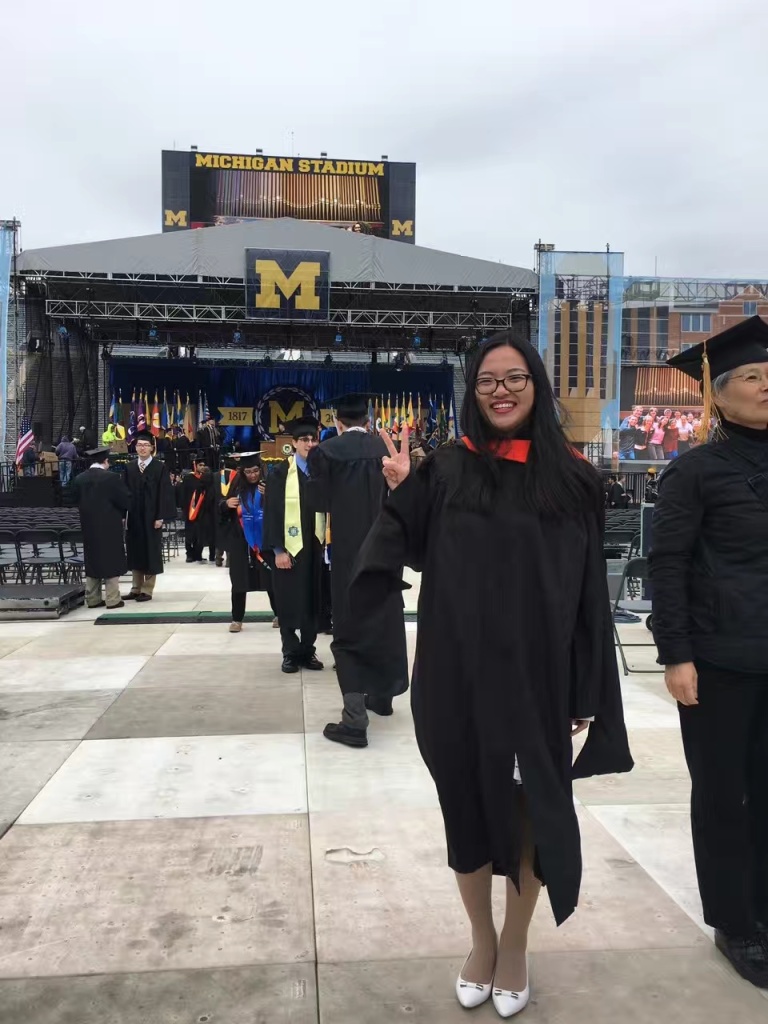
Photo credit: Bingbing Wu
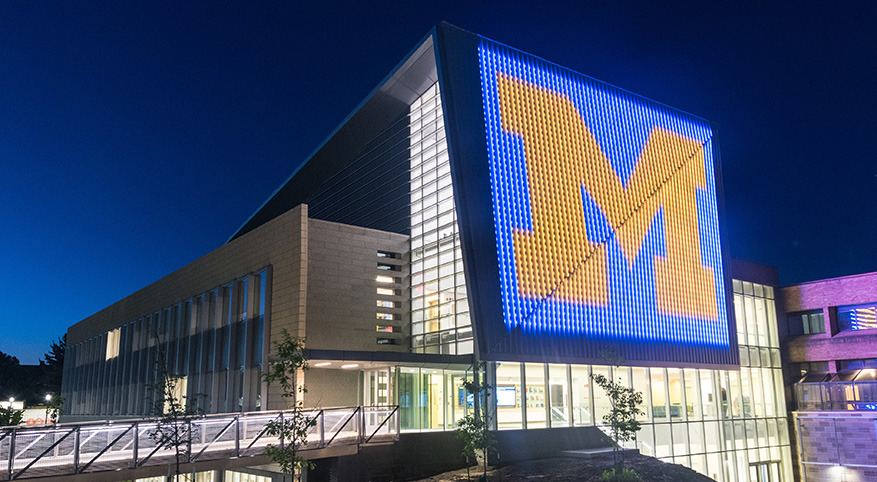
Picture credit: me.engin.umich.edu
- Details
In May Arts et Metiers president Laurent Champaney as well as Director of International and European Development Audrey Stewart, Research and Innovation Director Ivan Iordanoff and Co-director of TEES-ENSAM cluster Mohamed el Mansori, visited Texas A&M campus. Our Delegué General Amériques, and Houston-based AFAM operations committee member Patrice Brossard (Bo 195) joined the delegation.
Here is what Audrey Stewart said about the visit:
"A very fruitful visit to move forward in the setting up of a joint Arts & Métiers/TEES entity in the campus in Aix en Provence. Highlights of the visit included a meeting with Dr Kathy Banks, President of Texas AM University as well as the different Vice Presidents for Research, Education, Faculty development, and Strategic partnerships at the university system level, as well as with Dr John Hurtado, Interim Vice Chancellor and Interim Dean of Engineering and his team (research, education, entrepreneurship, international relations) in the College of Engineering.
Both Texas AM and Arts & Métiers are committed to the success of the AM² Transatlantic Partnership for the industry of the future in advanced manufacturing and material science whereby we unite our strengths to serve the global needs of industry in research, innovation, education and entrepreneurship."
Patrice Brossard added:
"Excellent meetings with Texas A&M. We do feel a shared desire to develop a real partnership based on the local network of French companies in Texas. Some development and follow-up needed on my side to make this partnership even stronger".
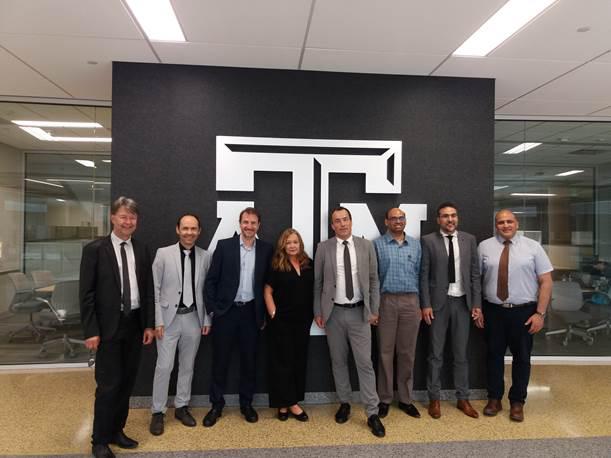
Arts et Metiers delegation in Texas A&M in May
- Details
On May 7th, gadz based in San Francisco bay area gathered in Saratoga to enjoy BBQ party together by the pool and have a small celebration!
The bronze medal was awarded to Aurore Prevot (Li 198), Arts et Metiers school representative in the US (2014-2018), former DG Ameriques, AFAM board member since 2018.
Aurore did a great job while while working as Arts et Metiers school representative in the United States. AFAM team members - Xavier Wartelle, CEO of AFAM, Marc Amblard, CFO of AFAM, Yarith Phay, AFAM Secretary and Jean Pommier, head of the Shasta comittee and AFAM board member -, congratulated Aurore on her exceptional community commitment.
Arts et Metiers alumni and students alike were enjoying the party, games and the pool.
Here is a short video taken during the event: https://youtu.be/tkWXoy2IQa0
Ambience in Saratoga, during the gathering: https://youtu.be/y1GhVED4aKw
Next event is planned in August and might take place in Palo Alto.
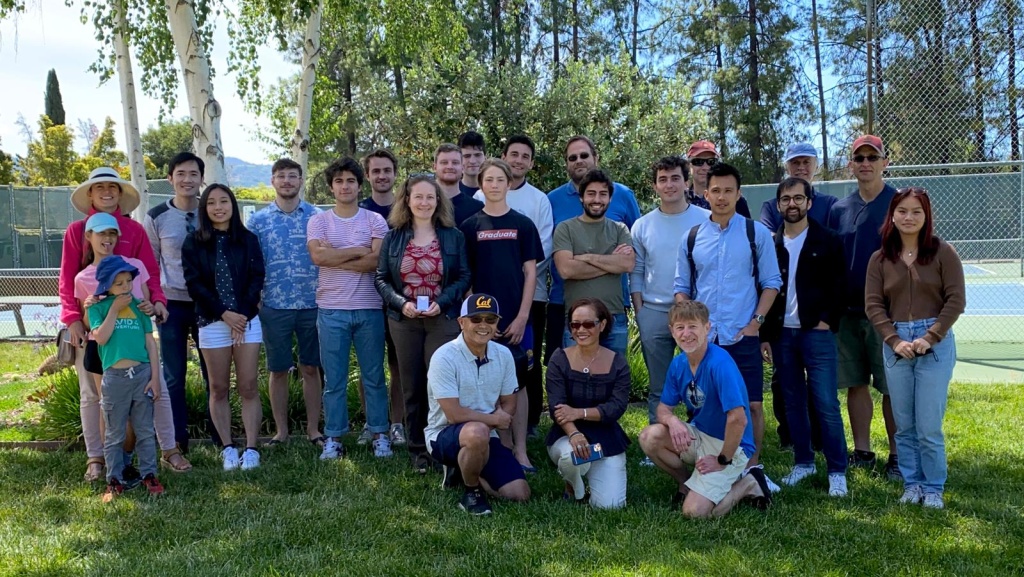
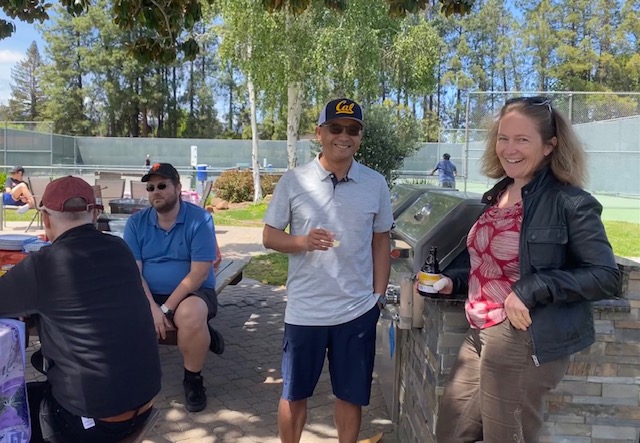
Yarith and Aurore
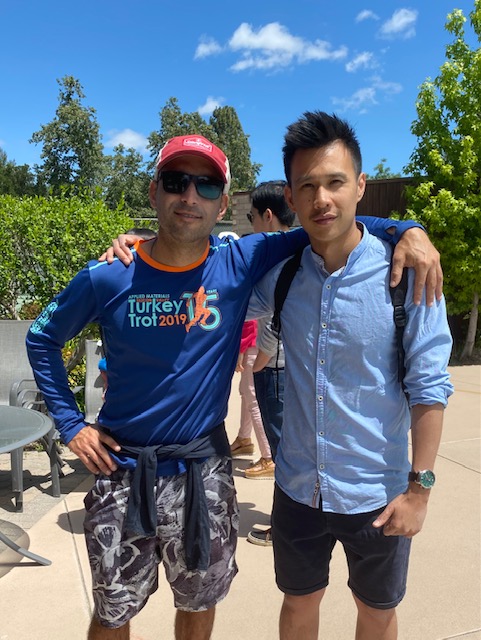
Jean-Marc and Thang Doan
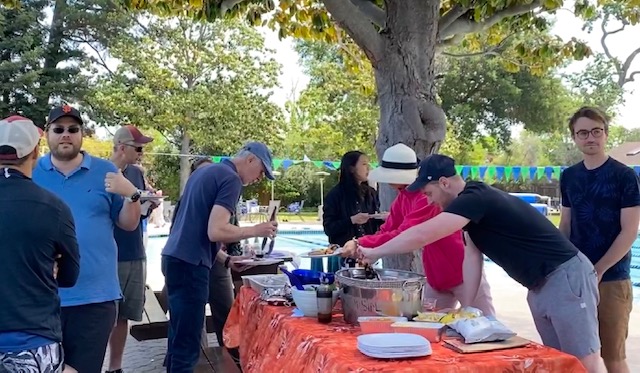
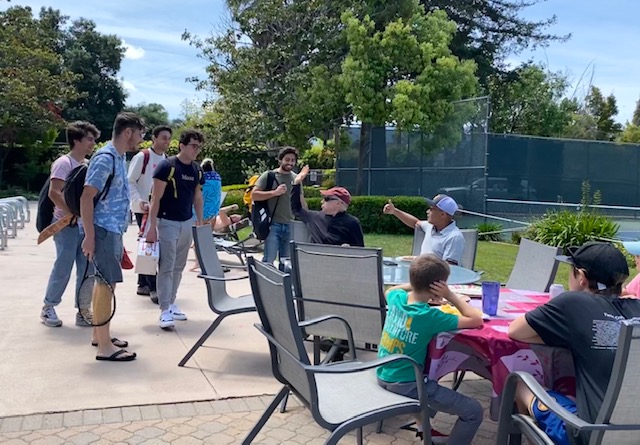
Students arriving from Berkeley to join the party
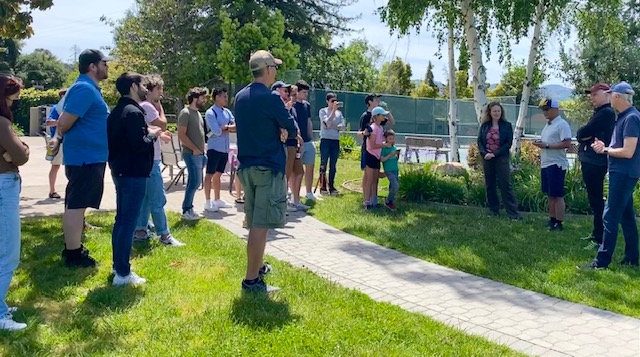
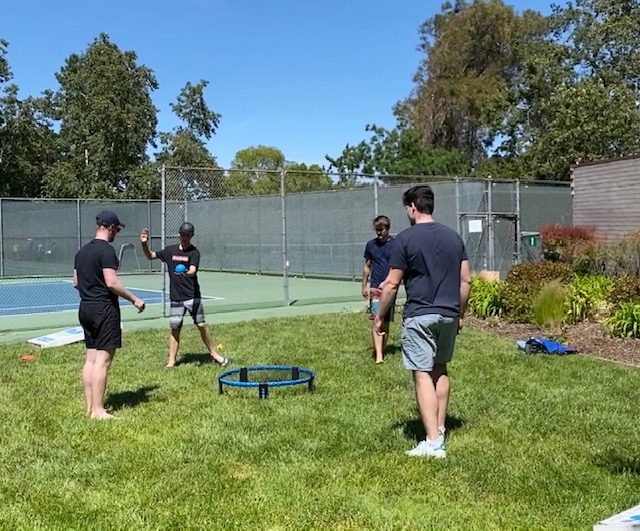
Having fun
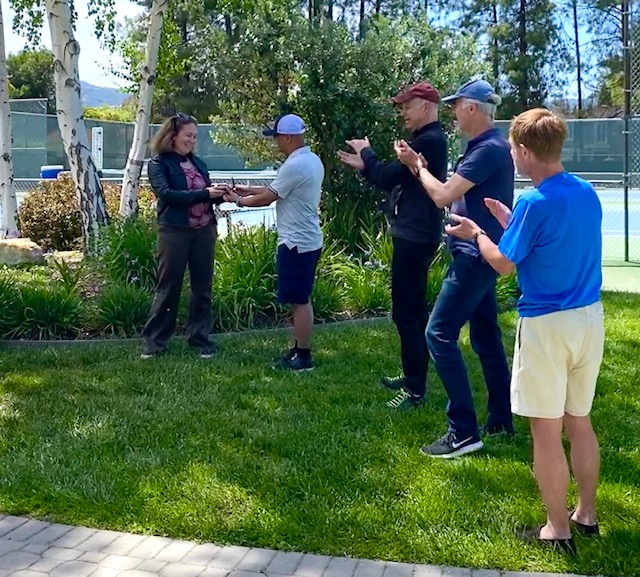
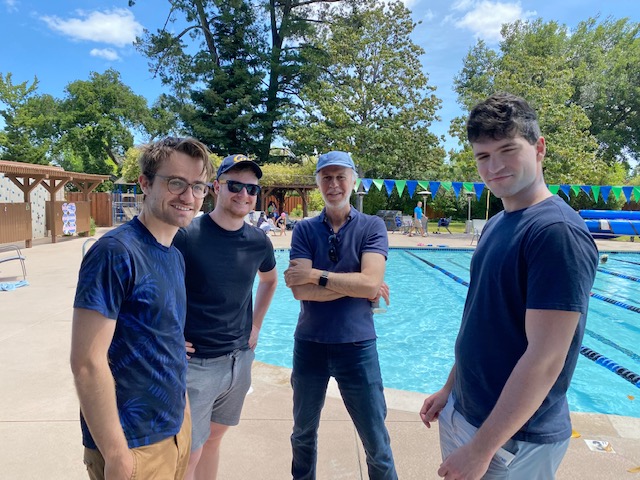
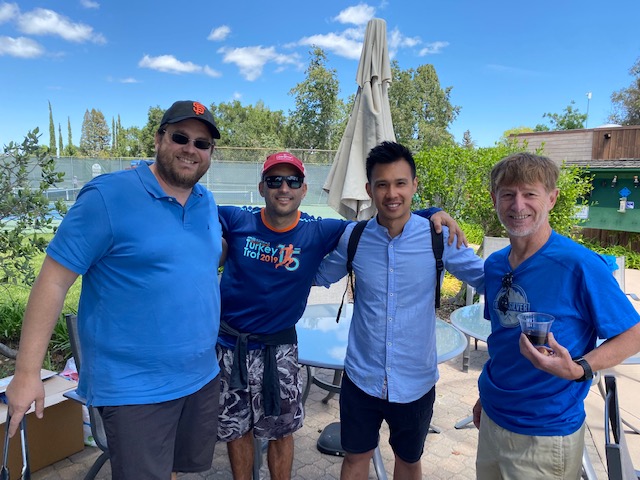
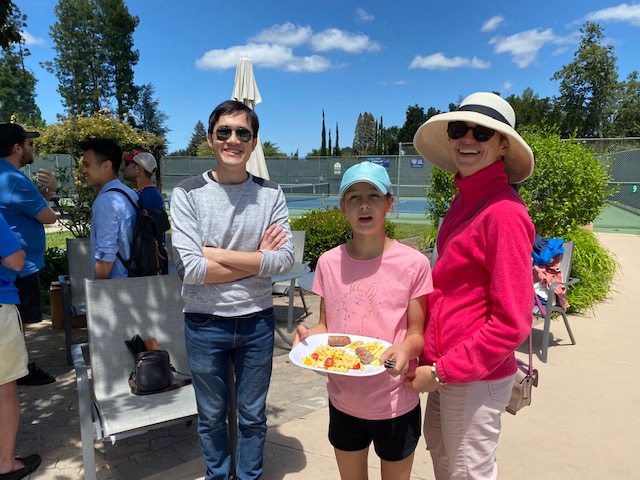
Nicolas Horde and Albina
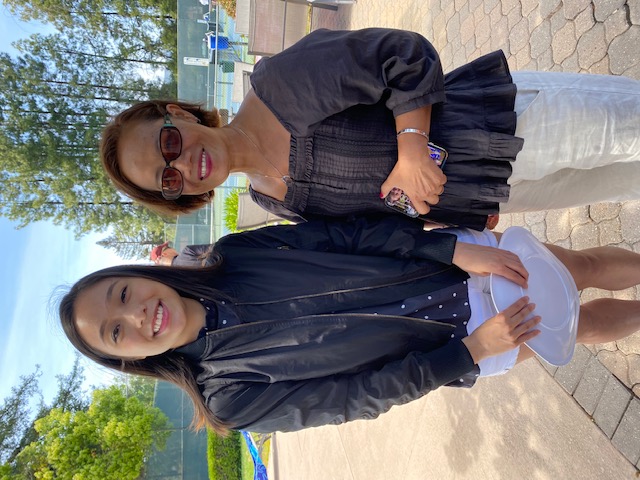
Lilia and Aude
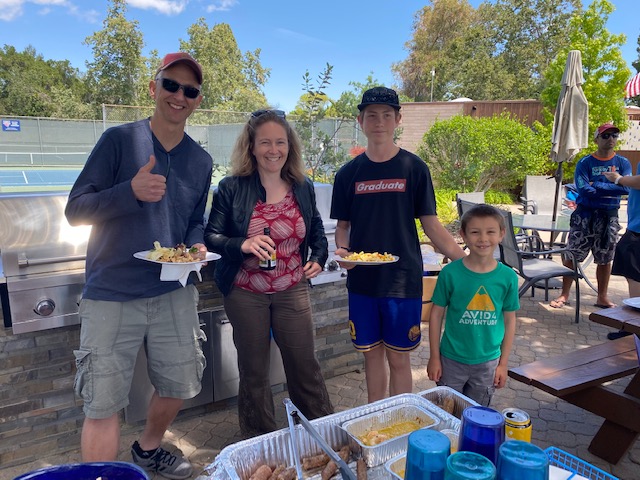
Olivier and Aurore
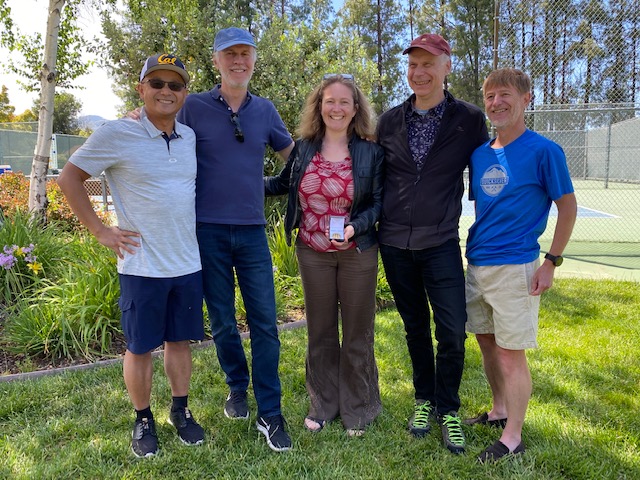
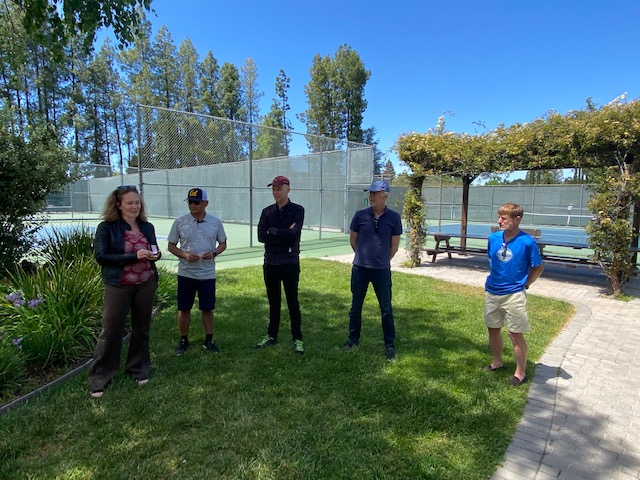
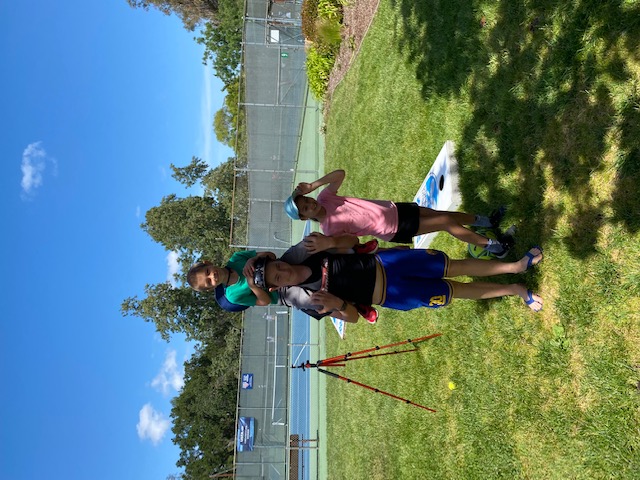
Children are always welcome to gadz parties
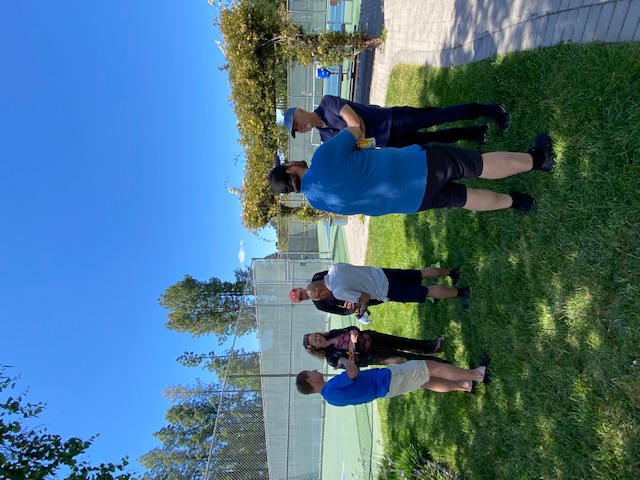
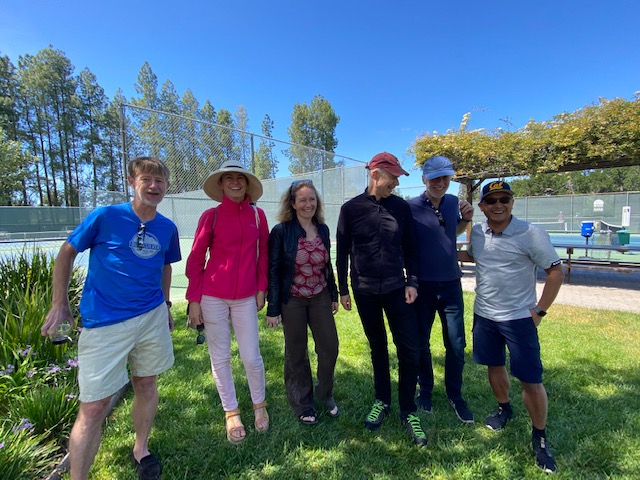
AFAM team: Jan Pommier, Albina Patou-Chebykina ( community manager), Aurore Prevot, Xavier Wartelle, Marc Amblard and Yarith Phay
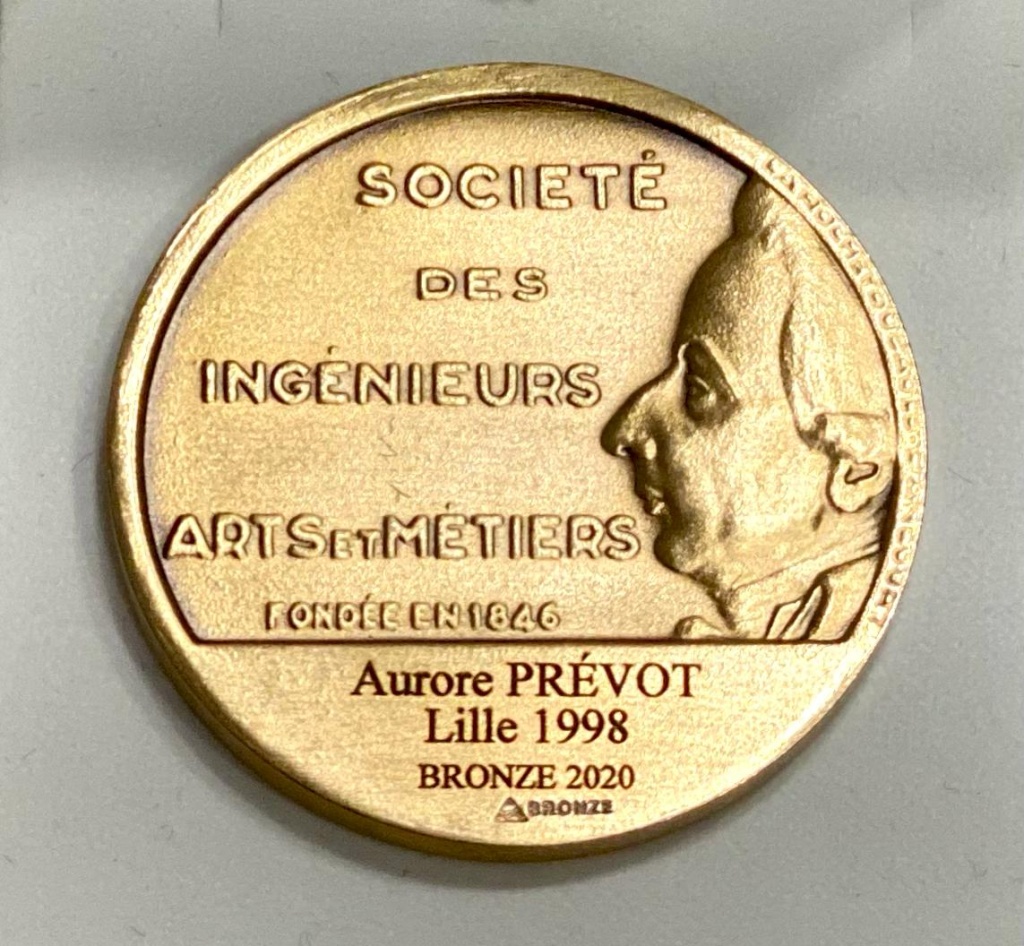
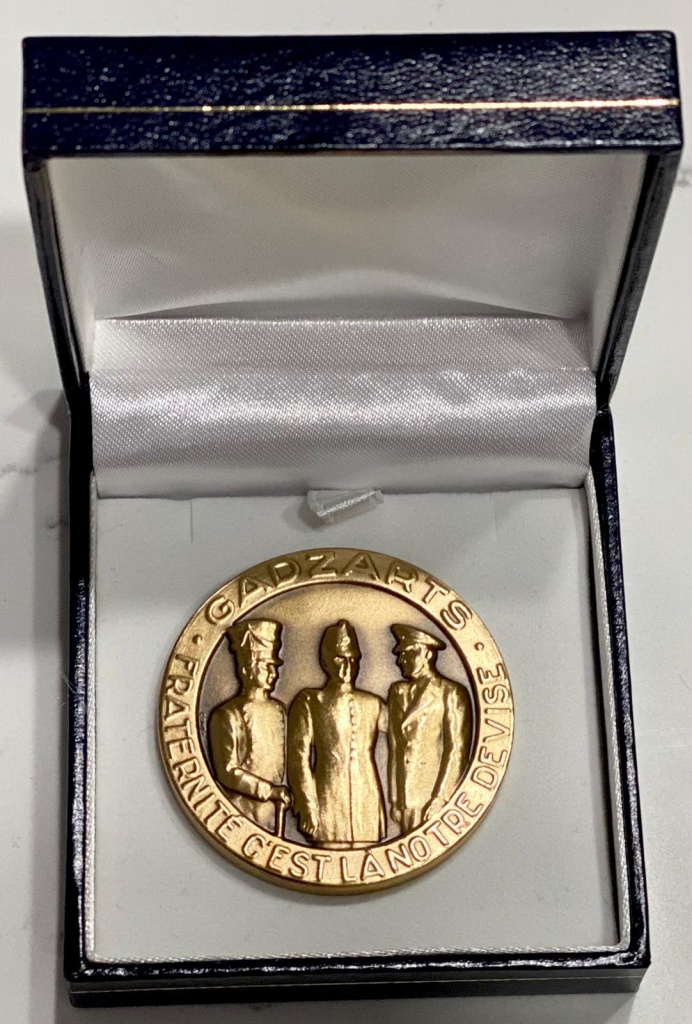
- Details
Interview with Pierrick Rauby (Me 214), Sébastien Sequeira (Bo 216) and Eymard Prevost (Li 215)
AFAM: Hello Pierrick, Sébastien and Eymard and thank you for sharing your experience of being students at GTL (Georgia Tech Lorraine). Please tell us a few words about yourself, what are you doing now?
Pierrick Rauby:
Hi Albina, sure, I have recently completed my Ph.D. at GeorgiaTech in Mechanical Engineering. I am now working as a Software Engineer in the Automation Team at Formlogic, a small precision manufacturing startup. My main focus is to develop high-frequency acquisition systems and data analysis algorithms for process control. I work remotely from Atlanta and really like the flexibility of my position!
Sébastien Sequeira: I am currently working as a Thermal Design Engineer at Tesla. I am focused on industrial stationary storage systems using batteries.
Eymard Prevost: currently in Atlanta, I have been working as a data scientist for Georgia Pacific since October 2019.
TAKE MY WORD FOR IT:
Since 1997, the School of Mechanical Engineering in Atlanta has developed graduate double degree program in partnership with Arts et Metiers
Georgia Tech Lorraine (GTL) is the European campus of the Georgia Institute of Technology, located in the historic city of Metz. On this campus, Arts et Metiers students can complete part of their mechanical engineering Master's degree ( 1 semester). Another semester will be completed on the Atlanta campus.
On the GTL campus, the admission and graduation requirements for the MSME are exactly the same as those on the GT Atlanta campus.French and American students also have the opportunity to study for the PhD within the UMI 2958 joint laboratory between the CNRS and the Georgia Institute of Technology.
Questions to Pierrick, Sébastien and Eymard:
AFAM: You are from different centers and different promos. How come that in 214, 216 and 215 respectively, you decided to apply for the GTL program?
Pierrick Rauby:
So, I learned about the GTL program when I looked at the different Arts et Metiers centers. It seemed to be an easier way to study abroad, so I chose to go to the center of Metz.
Sébastien Sequeira:
I wanted to have an experience in a foreign university with good engineering programs and professors because I was a bit disappointed by the quality of engineering classes during my 6 months at Arts et Métiers. So, I thought the American universities were the best for this but at the same time I wanted to stay two years on my campus (Bordeaux) to have the full student experience at Arts et Métiers. So GTL was the only option.
Eymard Prevost: well... to be fair I applied to the GTL program just in case things would not work out with the other masters I applied to...
AFAM: we all know that Arts et Metiers offers 2 different programs - GTL and parcours US. Have you ever thought about applying to parcours US? Why did you choose GTL? Any regrets?
Pierrick Rauby:
I think the issue with the Parcours US is that you are not sure about the university you're going to end up in, which is why I initially favored the GTL Parcours. However, the GTL Parcours, as it is, offers minimal exposure to the US university system; only 4 months is not enough. Then you do not have easy tracks like the OPT program to stay and work in the US, and the GeorgiaTech Master's Degree is not really valued in France. I am happy that I had the opportunity to stay longer than a Fall semester to do my Master's Thesis. Otherwise, I would have had big regrets.
Sébastien Sequeira: As mentioned in my previous answer, I choose GTL so that I didn’t have to change campus for my second year at Arts et Métiers. Also, with the parcours US you are not 100% sure about the outcome. Finally, I thought it was less expensive. No regrets, because my decisions were based on what I knew at that time. But now that I have more info about how graduate assistantship works, and what the application process for the master’s programs is, I would have chosen parcours US.
Eymard Prevost: No, I never planned to apply to the parcours US, and I have no regrets about it. However, if I had to apply again and choose between the parcours US and GTL, I would definitely go for the former (I’ll give details below)
AFAM: was it difficult to be selected for the GTL program? What was the most challenging part for you?
Pierrick Rauby:
It may have changed, but in 2014-2015, the process was like this: first, you need to have a good enough ranking during the 1A semester, but it was not super hard; I believe you need to be in the top 400 or so. Then there is a cover letter and interview phase with Art et Metiers professors from Metz. Finally, you are "allowed" to apply to GTL, but this phase is also easy. The most challenging part was the interview with the Arts et Metiers Professors; you really want to show that entering the program "fits" your plan of studies.
Sébastien Sequeira: It was not hard. The only challenge was the GRE test.
Eymard Prevost: No, it is relatively easy to get in. I would say the most challenging part was the GRE English test, but the grades that GTL requires are not too high. That was a stressful part though.
TAKE MY WORD FOR IT:
Congrats! You are in!
Things to think about when you are accepted to the GTL program
Explore all possible options to finance your studies:
Option 1. GRA (Graduate Research Assistantship)
GRA consists on working for a GT professor. The salary is up to $ 2350/month.
Often the lab, students work for, can cover tuition costs (please see Table 1). The work at the laboratory can deal more with applied or fundamental research and will require plenty of your time during the week.
Table 1 – Salaries and tuition reduction per position
|
|
GRA |
GTA |
GA |
|
Tuition |
Reduced by $15000 |
Reduced by $15000 |
No reduction ($15000/semester) |
|
Salary |
Up to $2350/month |
Up to $2350/month |
Up to $2350/month |
Sometimes GRA is coupled to a Master Thesis.
- Master Thesis
When you are in Atlanta, you’ll need to validate 12 academic credits to get your diploma.
To do so you can:
- Take 4 classes (1 class = 3 credits)
- Take 1 class and Master Thesis (9 credits), maximum 2 semesters
Besides, to keep your F1 status, American law requires to get at least 12 credit hours (not the same as credits).
So, if you are GRA without Thesis, you’ll need to take 4 classes to validate your diploma (12 credit hours) and it is very difficult.
The Master Thesis is connected to your GRA.
- GTA (Graduate Teaching Assistant)
English proficiency is required for GTA positions. You can become a GTA for undergraduate students teaching them math, for instance, ( it is to mention that after your French preparatory classes you have a very good level comparing to American students). You can also teach on a Graduate level.
Pierrick's, Sébastien's and Eymard's full report is available here to download ( you need to sign-up first)
Questions to Pierrick, Sébastien and Eymard:
AFAM: When you received a positive response concerning your application to GTL, what were your first steps to get ready for the program?
Pierrick Rauby:
The first thing to figure out is financing, but it's pretty easy to figure it out; either you have the money or need to get a loan. Around 30 to 35 thousand euros should cover tuition fees for the 2 semesters and the cost of living in the US. Then I would say that finding a place to stay during the Semester in the US is essential. Finding a house to rent in the HomePark area with friends is the best option. GT will push you to take on-campus apartments, but they are far from the Mechanical buildings and pretty expensive. Finally, it is good to look for a master thesis option and Graduate Teaching or Research Assistantship with a professor; it is an interesting experience. The sooner you start to look for it, the more chance you have to find one.
Sébastien Sequeira: First thing is about having your payment secured for the semester and get prepared for a semester in Metz. You need to choose your courses which I remember was a bit frustrating because you don’t have that many choices as you are in a small campus in Metz.
Eymard Prevost: find a place in Metz, prepare the visa application, polish my English skills.
AFAM: Do you think you missed some things before, during or after you joined the GTL program?
Pierrick Rauby: Hmmm, I am not sure on this one. I think I should have been more careful about the classes I took and be sure that they "fit" in what I am doing now. There is an introduction to Mechatronics that I regret not taking.
Sébastien Sequeira: Yes, in Metz I have been told that it was almost impossible to get a Master’s thesis opportunity in Atlanta. I am glad I discussed with Eymard at that time who told me it was actually possible and pushed me to give it a try. I also didn’t know how important it was to actually be on the American campus to have access to all courses. Transitioning from one campus to another within a year is actually not ideal. Moreover, if you are on the American campus for a full year, it’s easier to be part of engineering associations like Solar Racing, for example.
Eymard Prevost: yes: the fact that it is possible to stay longer than one semester in Atlanta (not an easy way, but this is doable). Another thing I was not aware of is the small amount of Mechanical courses that are offered on the Metz Campus. The choice is very narrow, and to be honest, a bit disappointing. Last but not least, I think that I initially did not realize how short the Fall semester in Atlanta would be (barely 5 months).
TAKE MY WORD FOR IT:
When contacting professors to find your desired GRA:
- Keep on contacting professors, do not quit (even after 2-4 refusals). Keep looking!
- Do not use your gadz or ensam email addresses, use your gatech one
- Contact during different periods of the year. News projects are coming in ALL the time and you can find desired opportunities. The best period though is March (for the Fall semester)
- Do not self-sensor and do not limit yourselves to Mechanical Engineering (you can look into aerospace, civil engineering, math etc.). Aerospace labs in particular offers a lot of opportunities to students
- Do not hesitate to go and see an academic advising manager at GT (Glenda Johnson)
- Be open to opportunities, attentive and grateful
Questions to Pierrick, Sébastien and Eymard:
AFAM: Did you have any additional classes to choose from?
Pierrick Rauby:
I remember taking the following classes:
- ME6222 Manufacturing Process and Systems: it will give you a more in-depth understanding of the manufacturing process, but you need to work regularly on it.
- AE6372 Aerospace Systems Engineering: it's 3 easy credits, but you will not learn much.
- ME6105 Modeling and Simulation in Design: It was a very interesting class with a great professor, but they have changed the professor since.
Sébastien Sequeira: Yes you need to choose your classes but if you are doing a Master thesis then you only have to take one course instead of four.
Eymard Prevost: well it depends: the Atlanta Mechanical department has a way better offer than the GTL one. However, if you are interested by taking classes from outside your department, Metz campus is better (in Atlanta it can be pretty hard to get enrolled outside from your major...)
AFAM: What were your favorite classes?
Pierrick Rauby:
I really like ME6105, and I would recommend taking ME6405 if you are interested in Mechatronics. In non-ME classes, I would suggest CSE 6242 Data Visualisation, but be careful if you are coming from a non-programming background. The projects are going to be very time-consuming.
Sébastien Sequeira: Aircraft Design in Metz though not an easy one and Introduction to Mechatronics in Atlanta.
Eymard Prevost: Artificial Intelligence class from the Computer Science Department. I took it while in Metz, which was a good choice, since it would not have been possible to take it in Atlanta. The material and the professor were amazing. It took me a lot of efforts, but that was worth it!
AFAM: What were the most challenging/difficult classes/ activities/practical elements for you?
Pierrick Rauby:
The most difficult was finding the balance between working for classes and discovering the country. It is very easy to stay with only French-speaking people and not get total exposure to the US university system and culture.
Sébastien Sequeira: First challenge was understanding everything about taxes, social security, health insurance etc which is a different system from what we are used to in France. Then, everything about research: how to write a paper, how to look into the literature, use textbooks which is very common for a US student but not for a French engineering student. Finally, get use to the American culture (still in progress…)
Eymard Prevost: even though France and US seem to be very similar, there are some details that make life quite different:
- tips is not in our culture, and it took a while to get used to it
- taxes are not included on the price tag, which at times can be very frustrating
- in France we are not used to having credit cards (what we call credit cards are in fact debit cards, hence I got confused more than once)
- making meaningful connections with other people (aside from French and European folks): suprisingly, GT is a pretty tough place to make friends, especially with people that are not from your country. Note that I am talking from Master’s student perspective. Bachelor is way easier, and PhD seems to be even worse
AFAM: Looking back to your GTL experience, what would you do differently and why?
Pierrick Rauby: I don't think I would change anything, but, as I said earlier, if you don't do a master thesis and just take your 4 classes, study, and go back to France, you're wasting your time and money.
Sébastien Sequeira: I would ask much more information about the experience on an American campus by directly talking to other students before making any choice. Typically have all the information about graduate research, research labs per university, engineering associations, specific courses, professors etc. We have, at least I had, a tendency to choose a university based on its ranking as French students (thank you “classe prépa”) but I think we should rather focus on what topics we want to learn about and what is the best university to learn about these topics.
Eymard Prevost: to be fair, I would do things completely differently by applying to the US parcours instead. The first thing to keep in mind is that if you want to have the option to work in the US after your master, GTL is definitely not the best choice. I was lucky to find a work around, but it was not easy, and I got lucky more than once. The second thing is to reconsider the price of the GTL master: at first glance, GTL seems to be a cost effective way to study in the US. But in reality, you end up spending barely 5 months in Atlanta, having very few interactions with the locals (some of my friends did not speak more than a few hours of English over the whole semester). Then, you come back to France, where it is pretty hard to value your degree (actually, none of the people I know got enough value from it to compensate the cost).
On the other hand, the US parcours seems to be expensive, but one can offset the cost by doing a GRA or a GTA. And you get to stay longer (At least 3 semesters). You can also choose your major.
For more information about GTL and our alumni:
Interview with Sébastien Sequeira (Bo 216)
Short testimonials of Sébastien and Eymard concerning Louis Magne scholarship
Georgia Tech and Atlanta Chronicles by Alexis Cassier (Me 215)
Pierrick's, Sébastien's and Eymard's full report is available here to download ( you need to sign-up first)
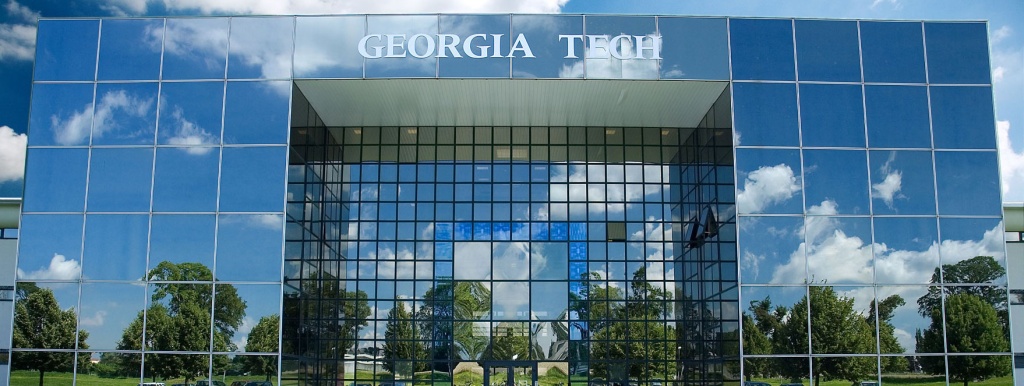
Picture: https://lorraine.gatech.edu/
- AFAM took place in an entrepreneurship ecosystem meeting
- AFAM organized an online event to talk about American visas
- Gadz US energy networking (in person) took place in Houston
- What our students are saying about their participation in Shasta, mentorship and the role AFAM played in their internship search
- AFAM board meeting took place on March 7th - what are the projects and tasks ahead of the associaton and the school?

 BLOG /
BLOG /  CALENDAR /
CALENDAR /  DONATIONS /
DONATIONS /  MENTORS /
MENTORS /